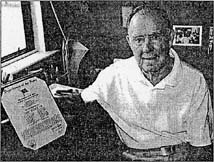Honor brings back memories
for gunner in Doolittle Raid
by Eric Gonzales
| | |  |
| "On the occasion of the 50th anniversary of World War II, it is appropriate to take the time to reflect on the unique and daring accomplishments achieved early in the war," reads a citation given to World War II veteran Richard Burke. | | The Middletown Township resident was an anti-aircraft gunner aboard the USS Hornet, the carrier that launched 16B-25 bomers in the Doolittle Raid on Japan. |
MIDDLETOWN TOWNSHIP – When Richard Burke joined the Navy in 1940, he knew the United States would soon be at war.
"I was 22 years old, and I had nothing holding me down," Burke, now 78, said. "I just wanted to get in before I got drafted so I could pick my branch of service."
A year later, the United States was fighting in World War II, and losing the fight in the Pacific. As part of the Doolittle Raid of April 18, 1942, Burke helped change that.
In the first direct attack on Japan, Burke was an anti-aircraft gunner on the deck of the USS Hornet, the aircraft carrier from which sixteen B-25 bombers were launched 800 miles east of Tokyo.
The raid inflicted little physical damage but had an important psychological impact, halting momentum the Japanese had been building since the Pearl Harbor attack 16 months earlier.
Burke later took part in more famous missions, but none more important than the Doolittle Raid. After 53 years, those who took part in the raid are being officially commended.
A citation received by Burke from John H. Dalton, Secretary of the Navy, reads, in part:
"On occasion of the 50th anniversary of World War II, it is appropriate to take the time to reflect on the unique and daring accomplishments achieved early in the war.
"The raids gave an enormous boost to the American people in those dark and early days of the war."
The mission was the first time bombers had taken off from an aircraft carrier, Burke said.
"We thought we were sailing into suicide. Once the bombers took off, we were just relieved to get out of there," Burke said.
"We didn't find out for a while that the mission was successful."
Due to bad weather, 15 of the planes, carrying 75 fliers, crash-landed in China.
"The rain and wind were so bad that day the whole ship was tipping back and forth," Burke said. "We had to time the takeoffs so the bombers didn't run into the water."
Three men died in China, and eight were captured by the Japanese. Three of these were executed, and one died in a Japanese prison. The four survivors were freed at the end of the war.
"A few didn't come back, but I always had a lot of faith in the Navy and in our ships," Burke said.
After the Doolittle raid, the USS Hornet sailed to Guadalcanal, then to the Midway Islands, where it was sunk by the Japanese. Burke was rescued from the water by an American destroyer.
"The activity at Midway was sensational," Burke said. "Planes were falling into the water, and one cruiser was up in flames."
After his rescue, Burke returned to San Francisco, the port of the Hornet, and during a three-day leave, married his wife Doris.
Burke returned to Guadalcanal as part of a field artillery unit, then was transferred to Okinawa, and was there when Hiroshima and Nagasaki were bombed.
By the time of his military retirement in 1946, Burke had earned several commendations, including the Bronze Star.

